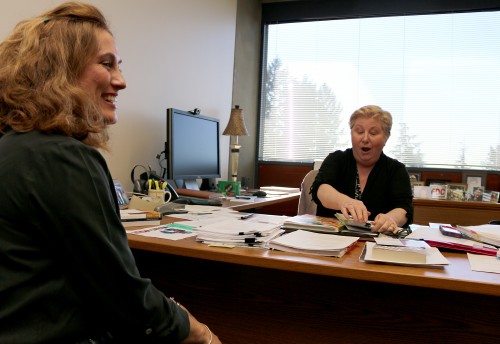This content was published: March 16, 2015. Phone numbers, email addresses, and other information may have changed.
Q&A with Chris Chairsell: PCC prepares for evaluation team visit
James Hill and Kate Chester
Portland Community College’s mission is straight-forward: advance the region’s long-term vitality by delivering accessible, quality education to support the academic, professional, and personal development of the diverse students and communities it serves.
Embedded within the mission are the college’s core themes – access and diversity, student success, quality education, and economic development and sustainability. PCC’s ability to fulfill its mission through the core themes [pdf] will be the focus of an upcoming accreditation visit from Northwest Commission on Colleges and Universities. The college will host the site visit by a seven-member evaluation team from Monday, April 27 through Wednesday, April 29.

Chris Chairsell (right), vice president of academic & student affairs, shares a light moment with Kate Chester, PCC’s Public Relations manager, as they discuss the college’s accreditation report.
We sat down with Chris Chairsell, PCC’s vice president of academic & student affairs, to review what staff and students should expect from the visit. She said it will be a chance for the college as a whole to reflect on how PCC is fulfilling its mission, its fundamental values, and where it wants to go as it relates to the mission’s core themes and the college’s newly developed Strategic Plan.
For additional details on the process, visit PCC’s webpage on accreditation.
Here’s what she said:
Question: Why is PCC having an evaluation team visit?
Chairsell: PCC is reviewed regularly over a seven-year period; we are being reviewed for year seven and must provide evidence that we are fulfilling our mission. There are core themes directly linked to the mission that we will report on, and the evaluation team will assess how we are working, planning and fulfilling these themes. Between now and the accreditation visit, we encourage all faculty, staff, and students to review the core themes: access and diversity, student success, quality education, and economic development and sustainability.
Q: Can you describe the process?
Chairsell: Having read our report, a team of seven evaluators will arrive to PCC and spend two-and-a-half days with us meeting, questioning, clarifying and validating our processes and policies.
Q: Who is involved at the college?
Chairsell: All areas of the college were involved in the writing of the report, with more than 50 people contributing. On site, the chair of the evaluation committee will confer with her team and then inform us of who they want to meet. It might be human resources to review such processes as hiring, employee evaluations, etc. It could be finance, to review our budget and resource allocation processes, or it could be Sylvia Kelley (district executive vice president) concerning the college’s Strategic Plan. They may wish to speak with deans, directors and other managers to discuss operational processes. I think they most certainly will want to speak with faculty and students.
Q: When will this happen and what will follow?
Chairsell: The evaluation team will hold a “report out” for the college at the conclusion of its April visit, which is open to any interested person at the college. The team will share its findings, recommendations, and commendations, and then will depart. While discussion opportunities with the evaluation team occur during the visit, they don’t take place during the report out.
Evaluation team members may leave us with recommendations – this translates to “needs improvement” – and we will be required to make these improvements or changes, then regularly report on them until the commission is satisfied that the recommendations have been thoroughly addressed by the college.
The evaluation team will write a report of findings for the NWCCU, and PCC should receive a copy of this before the commission’s summer meeting. This meeting generally takes place in June or July.
The next step is for PCC’s accreditation team, Dr. Jeremy Brown and I to meet with the entire NWCCU commission and the evaluation team chair at the summer meeting, to report on the evaluation team’s findings. The commission will have its own questions, and in all likelihood it will accept the report. There is the chance that the commission could opt to conduct the meeting by phone; it is at the commission’s discretion.
Q: What is the history of our accreditation?
Chairsell: PCC has been accredited since it first opened its doors more than 50 years ago. Historically, accreditation visits have been done every 10 years. About five years ago, it became an every-seven-year process, which for PCC meant we needed to condense seven years of work into five years.
The seven-year process requires that we check on our progress and improvements annually until the next visit, and for this reason the seven-year cycle is much improved over the former 10-year version. Our most recent accreditation visit was a tremendous success, and our accreditation continues to be reaffirmed as we refine and improve PCC processes in an ongoing fashion. Overall, the accreditation visit is a collegial one, with administrators and faculty coming to our college from various institutions outside Oregon.
Q: What are the goals?
Chairsell: Our overall goal is to showcase the very best of PCC. We are one of the largest educational institutions in the Northwest, and that can be intriguing to colleagues who participate in these evaluations. We have much to be proud of in terms of how we go about serving students and the community at large.
Staff and students will be asked to participate in the visit, however, who participates is determined by the chair of the evaluation team. The chair leads the visit and determines the schedule and individuals the team wants to meet.
Again, for more information about the upcoming evaluation visit, review PCC’s webpage on accreditation.


I see PCC as a good institution for SA and courage all student to pursue their dreams